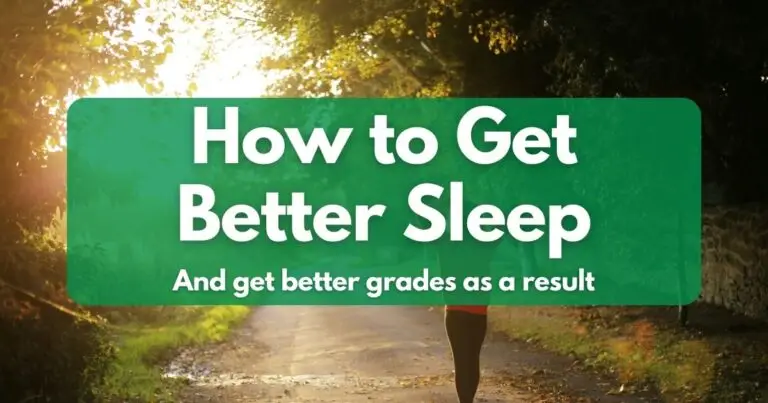[0:00:01] Hi everyone. It’s Pete from Achieve Tutorials. Today we’re going to talk about how to get better sleep and the importance of sleep. Teens need sleep, and experts say that they should get 8 to 10 hours of uninterrupted sleep every night. The reality is that rarely happens. In fact, only 3% of American teens get the recommended number of hours of sleep every night. There are a lot of reasons for this, including the fact that teens, across all cultures all over the world, are biologically programmed to stay up late and sleep in late. This is technically called a delay in the sleep wake cycle.
[0:00:42] One of the problems with this is that schools start so early in the morning. This is a challenge for students who have to get up before their biologically programmed wake up time in order to get to school. But the good news is you actually can reprogram your sleep cycle. Now let’s talk about the effects of poor sleep on your body, of poor sleep habits, not getting that 8 hours of sleep every night. Kids who don’t get enough sleep get sick more often because your immune system is weakened. It’s also a lot harder to maintain a healthy weight, and kids who don’t get enough sleep tend to gain weight more readily than other kids.
[0:01:20] There’s also really an increased risk of long-term health problems such as diabetes, heart disease, stroke, a whole slew of problems if you don’t build nice, healthy sleep habits starting when you’re young. Not getting enough sleep can increase anxiety or depression. Your mental health is really important, and getting sleep is a very valuable aspect of boosting your own mental health. A lot of students have difficulty focusing, thinking clearly, and remembering things from school because they’re so tired and sleep deprived.
[0:01:51] And that sleep deprivation can lead to crankiness, which actually affects your friendships and your relationships with other people. And this sleep deprivation can actually lead to poor decision making, which itself can lead to an increased number of injuries. Okay, so let’s get right into how to get good sleep. So this is a ten step process that you can follow to build good, healthy sleep habits to get yourself that 8 hours of sleep that you really need to function properly.
[0:02:21] First thing is to get outside, get some exercise. Bright light during the day, especially in the morning, is really valuable. Second, definitely avoid the caffeine in the evenings and even in the afternoons. Caffeine has a lingering effect and it really interrupts your sleep cycles. Even if you feel like you can fall asleep quickly after having caffeine, it’s going to mess with your cycles at night. You also want to avoid eating a really big meal right before bedtime. But if you’re a little hungry, you can have a healthy snack. That’s fine. Not a problem.
[0:02:52] We often strive to drink enough water during the day, but it turns out that drinking water right before you go to bed is not a great idea. Okay, this next one is maybe the toughest, and that is to keep a consistent sleep schedule. Create your own sleep ritual and get to bed at the same time or very close to the same time every single night, including on the weekends. No binge sleeping on weekends, please. That actually completely messes with your sleep cycle and makes it harder to get up and focus during the week.
[0:03:21] Next. And this one is also really challenging for all you teenagers out there: No blue light exposure for 30 to 60 minutes before sleep. And that means computers, tablets, cell phones, TVs…all of these things emit blue light, which makes your body think that it’s daytime. So if you have to be on a device, and I mean have to not, “oh gosh, I need to text my friend back.” But if you have to be on, use the built in night shift, nightlight or night modes, depending on which system you’re using. And in fact, set a schedule so that it always turns on at, say, 09:00 at night.
[0:03:53] Next. You want to really optimize your sleep environment. Make sure that you use your bed for sleep. That’s what it’s for. It’s not a place to study. It’s not a place to watch TV or to play games. It’s a place to sleep. That actually really helps your body understand that when you lie down in bed, it’s sleep time, not time to do something else. Keep your room dark and cool. Too much light or too much heat actually makes it difficult to sleep.
[0:04:18] It’s a good idea to try to block out any background noises by using something like a white noise app or a white noise machine. Something that produces a really consistent sound, not music. Music, it turns out, doesn’t help people fall asleep, but something like a white noise app is a great idea. You can also try meditation or yoga or take a warm shower or bath before bed. Anything that helps you to relax.
[0:04:42] And if you find yourself in bed and you can’t fall asleep for 20 minutes or more, get up for a few minutes. Do something boring. Make sure that you don’t turn on any bright lights, definitely not looking at a screen. But get yourself out of bed and get yourself tired again so you can climb back into bed and fall asleep. And finally, if you’re one of these people who worries about a lot of things at night, one of the ways to get over that worry at night is to write down a list of anything that’s bothering you as a to do list for tomorrow and then file it away in your brain as something that you’re going to do tomorrow, not tonight.
[0:05:20] Okay, that’s it. Ten steps to better sleep. Try all of these things and really try to schedule in at least 8 hours of sleep a night if you possibly can. You will be happier, healthier and you’ll do better at school. All right, everyone, catch you later.
Thank you for watching. And for more information you can go to our website for more videos on our blog or subscribe to our YouTube or Instagram feeds. And don’t forget, Aim Higher.





